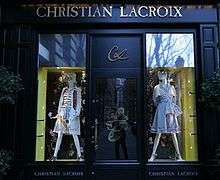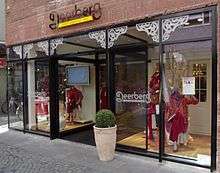Boutique
| Look up boutique in Wiktionary, the free dictionary. |


A boutique is "a small store that sells stylish clothing, jewelry, or other usually expensive things".[1] The word is French for "shop", which derives ultimately from the Greek ἀποθήκη (apothēkē) or "storehouse".[2][3]
The term "boutique" entered into everyday English in the late 1960s when, for a brief period, London was a fashion capital. Carnaby Street and Kings Road (London) were the focus of much media attention for having the most fashionable stores of the era.[4]
Boutique industries
This term can also refer to a specialized firm in other industries, such as a boutique investment bank or boutique law firm. The word is often used to describe a property in the independent sector of the hotel market (such as The Rockwell in London) in order to distinguish itself from larger chains (such as Hilton Hotels). In such cases, the establishment aims to convey the idea that its operation is small, elite and highly specialized.
Some multi-outlet businesses (chains) can be referred to as boutiques if they target small, upscale market niches.[5]
Recently, the term "boutique" has begun to be applied to mass-market items that are either niche or produced in intentionally small numbers to be sold at very high prices. This can be referred to as boutique manufacturing. For example, before the release of the Wii, a Time Magazine article suggested that Nintendo could become a "boutique video-game company", producing games for niche audiences rather than trying to compete directly with Microsoft and Sony.[6]
Although some boutiques specialize in hand-made items and other unique products, others simply produce T-shirts, stickers, and other fashion accessories in artificially small runs and sell them at high prices.
Boutique lifestyle
In the late 1990s, some European retail traders developed the idea of tailoring a shop towards a lifestyle theme, in what they called "concept stores",[7] which specialized in cross-selling without using separate departments. One of the first concept stores was 10 Corso Como in Milan, Italy, founded in 1990, followed by Colette[8] in Paris and Quartier 206[9] in Berlin. Several well-known American chains such as Urban Outfitters,[10][11] Dash, and The Gap,[12] Australian chain Billabong and, though less common, Lord & Taylor, adapted to the concept store trend after 2000.
See also
Notes
- ↑ "boutique". Merriam-Webster's Dictionary. Retrieved October 1, 2014.
- ↑ boutique, on Oxford Dictionaries
- ↑ ἀποθήκη, Henry George Liddell, Robert Scott, A Greek-English Lexicon, on Perseus
- ↑ Avalith. "Historypin - Tours - Carnaby Street, 1960's London.". historypin.org.
- ↑ "Starting a Boutique Business". Jalingo.co. Retrieved August 23, 2015.
- ↑ Frederick, Jim (December 8, 2003). "The Console Wars: Game On". Time. Retrieved April 26, 2010.
- ↑ "New retailers floor customers". Sydney Morning Herald. April 19, 2004. Retrieved 2008-10-29.
- ↑ Katya Foreman. "Colette Unveils Redesigned Store Interior". WWD.
- ↑ "Quartier 206". unlike.net.
- ↑ "Urban Outfitters: Dressed For Success". Forbes. December 20, 2007.
- ↑ Wernick, Ellen (2003). "Urban Outfitters, Inc". International Directory of Company Histories.
- ↑ "colette and Gap collaborate on new store (Vogue.co.uk)". Vogue UK.